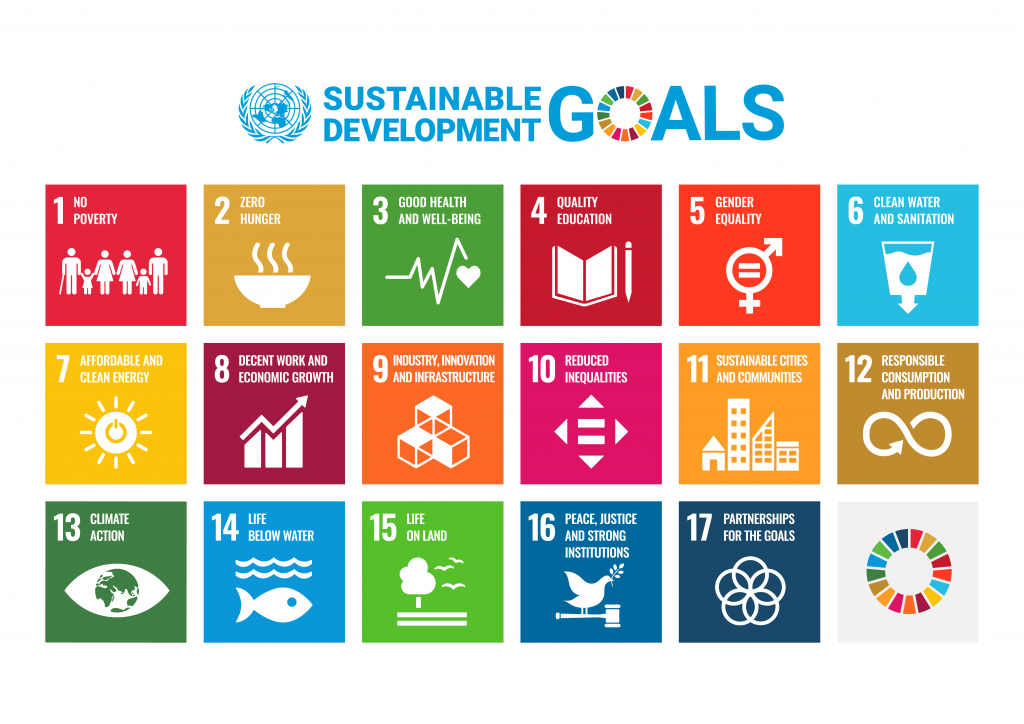The SDGs framework
The 2030 Agenda adopted by the United Nations member states defines the Sustainable Development Goals (SDGs), breaking them down into specific targets to which individuals and communities of any kind—including businesses—should align their strategies and behavior in order to ensure responsible and ethical conduct, preserve the ecosystem, and achieve social progress.
CIR has defined a clear alignment between its strategic objectives and the UN 2030 Agenda Sustainable Development Goals (SDGs), identifying those on which it can have a direct and measurable impact. Action unfolds across multiple dimensions: environmental, social, economic, and governance.

Our commitment to sustainable growth
CIR views ESG values (Environment, Social, Governance) as fundamental levers for its evolution and competitiveness in the market.
In 2024 the Board of Directors continued the ESG integration begun in 2021, with concrete results: almost all sustainability plan objectives were achieved thanks to initiatives in healthcare quality and innovation (KOS), targeted investments in sustainable mobility (Sogefi), increased use of renewable energy, waste reduction and improved energy efficiency in processes, as well as significant progress on safety, training, and gender equality for human resources. The application of ESG criteria also extends to the management of the parent company’s financial assets.
The ESG plan maintains its focus on four strategic areas:
- Governance & Advocacy;
- ESG-driven Innovation;
- Eco-compatibility;
- Well-being of individuals and communities.
Each Group company has translated specific objectives on these pillars, with ambitious targets, measurable results, and annual monitoring to ensure the effectiveness of actions. The year 2024 confirms the acceleration of this path and the full integration of sustainability into the Group’s business model.
Governance and Advocacy

CIR considers transparent governance and attention to legality a fundamental prerequisite for achieving sustainable success over the long term. The holding mainly acts through strategic decisions on governance and advocacy within its subsidiaries, through a series of concrete initiatives:
- Responsibility and best practices: implement a governance model that promotes responsibility, transparency, and adoption of international best practices;
- Diversity and inclusion: serve as a reference for the entire Group, promoting diversity, with particular attention to gender composition in corporate bodies;
- Code of Ethics: adoption of a Code of Conduct grounded in ethical excellence and the Group’s values, integrated into corporate policies;
- Ethics & compliance training: ensure that all personnel adhere to the Code of Ethics and receive ongoing training on compliance, 231, anti-corruption, whistleblowing, and privacy;
- Reporting system: implement and update an effective whistleblowing mechanism, compliant with Legislative Decree 24/2023, protecting reporters and reported persons and promoting a culture of merit and transparency;
- Integrated control safeguards: strengthen an internal control system that ensures legality, transparency, and rigor in all activities, in collaboration with the Board of Statutory Auditors, Internal Audit, and the Supervisory Body;
- ESG focus in top roles: include environmental, social, and governance topics among the fundamental missions of the Board of Directors and the Control, Risks and Sustainability Committee;
- Sustainable incentives: align management and employee incentive plans with ESG objectives, encouraging the achievement of targets linked to sustainability, safety, diversity, or emissions reduction;
- Transparent reporting: inform the market in a structured and timely manner with ESG reports on progress achieved.
“ESG driven” innovation



CIR promotes responsible innovation within its subsidiaries, supporting the development of technological solutions that create sustainable value and strengthen the Group’s competitive positioning.
- ESG integration in products and services: we support KOS in developing advanced healthcare services (telemedicine, home care) with strong social content. For Sogefi we encourage the evolution toward lighter, more efficient components in support of electric mobility;
- Investment in sustainable R&D: the subsidiaries allocate resources to improving product life cycles, with criteria of energy efficiency and reduced environmental impact;
- Innovative collaborations: we launch partnerships with universities, start-ups, and research centers to spur ESG-oriented solutions.
Eco-compatibility



CIR strengthens its commitment to environmental protection, promoting initiatives and high standards of eco-sustainability along the entire value chain.
- Climate-neutrality objectives: we measure and reduce Scope 1 and 2 emissions, focusing on energy efficiency, renewable energy, and intelligent monitoring systems;
- Circular economy: we promote materials recycling, waste minimization, recovery, and optimization of production processes, engaging suppliers and partners in the ESG journey;
- Responsible management of natural resources: we optimize the use of water and raw materials, implement sustainable sourcing policies, and promote environmental protection practices in operating areas;
- Environmental certifications: we launch ISO 14001, EMAS, and other certification pathways to strengthen the effectiveness of environmental policies.
Well-being of individuals and communities





CIR places people and the community at the center of its model, integrating safety, training, and inclusion into a responsible corporate culture.
- Health and safety at work: we apply rigorous standards to prevent accidents, with data-monitoring systems, continuous training, and educational programs that promote a safety culture;
- Professional development and inclusion: we foster skills development and meritocracy through training plans, mentoring, and diversity & inclusion projects, with concrete goals on gender equality and the role of women in top positions;
- Welfare and quality of life: we offer tools for work-life balance, support services, and initiatives dedicated to families, mental health, and overall well-being;
- Engagement with local communities: we promote social responsibility projects focused on inclusion, education, and local development, strengthening the bond between the Group and the territories where it operates.
